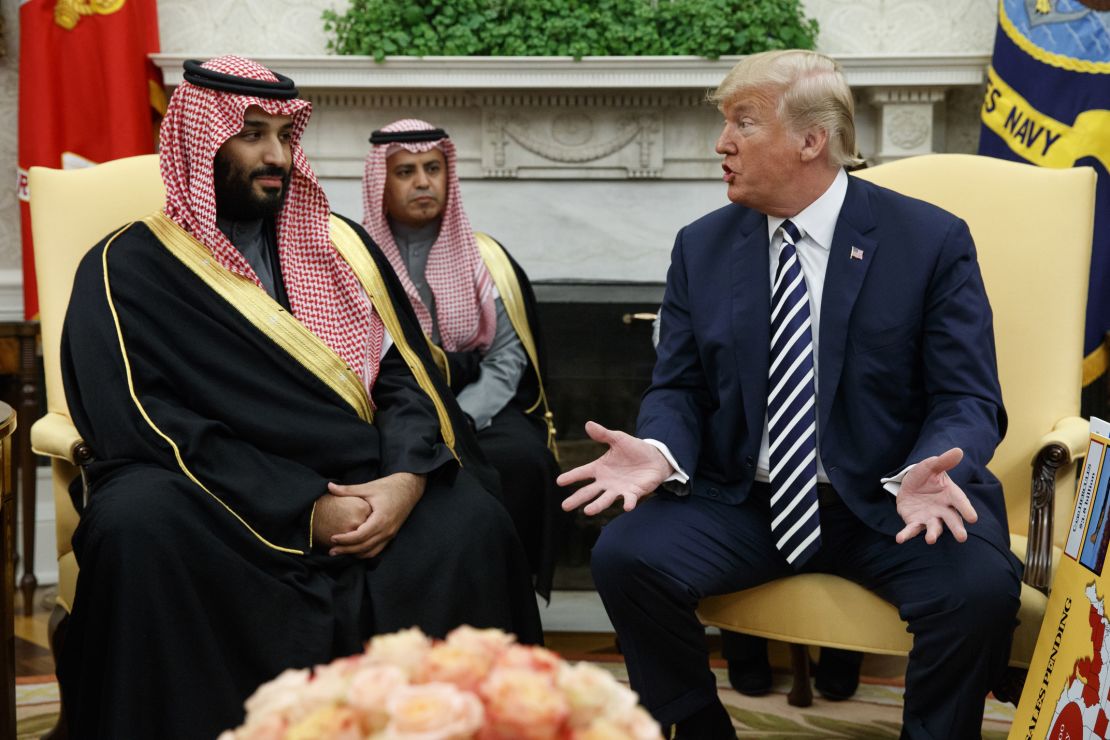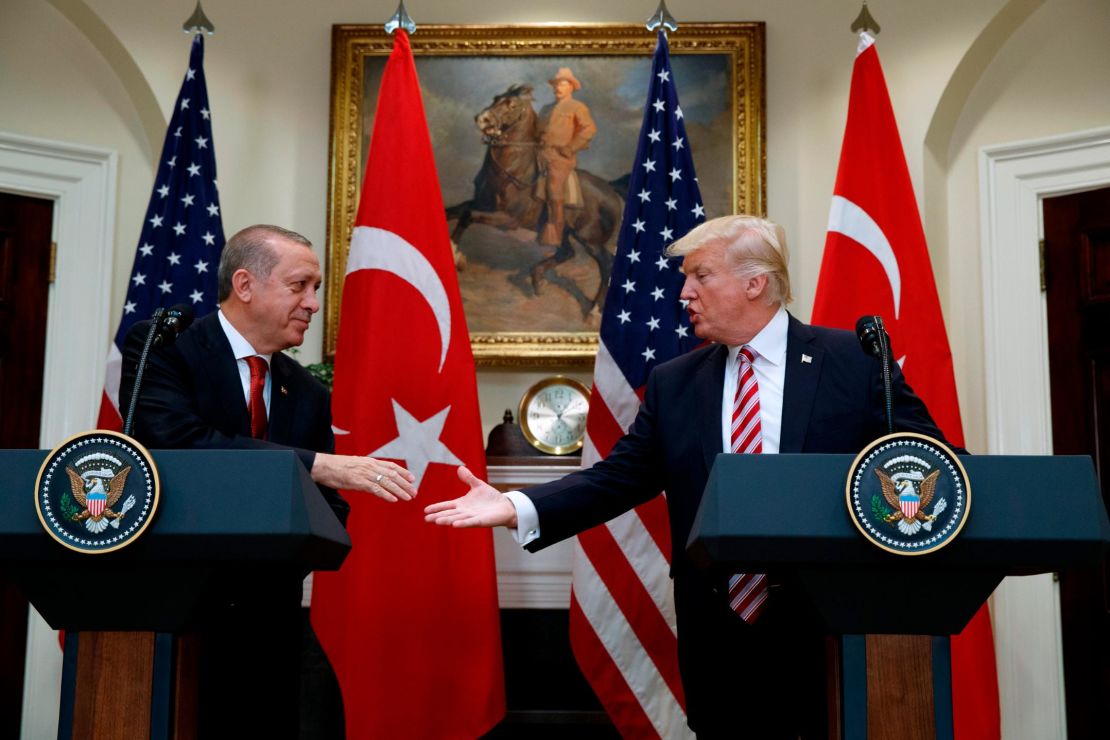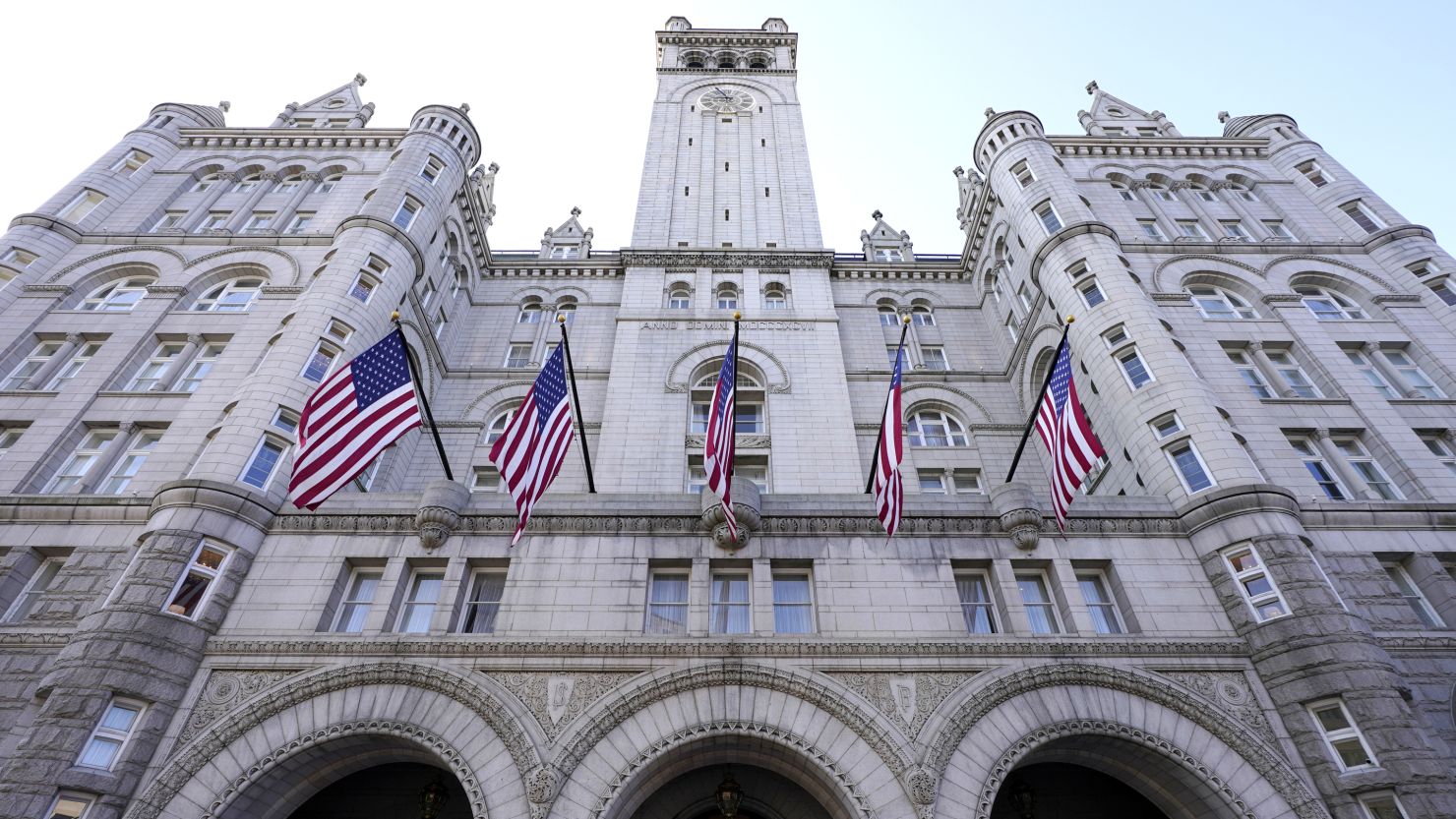The governments of six foreign countries, including Saudi Arabia, Qatar and the United Arab Emirates, spent more than $700,000 at then-President Donald Trump’s Washington, DC, hotel over the first two years of his presidency, according to newly released accounting documents.
The new documents offer concrete evidence of the rare practice of foreign governments spending money directly with businesses owned by a sitting president, which Democrats on the House Oversight Committee say raise new questions about possible efforts to influence Trump through his companies while he was in the White House.
The hotel accounting records were obtained by the House Oversight Committee through Mazars, Trump’s former accounting firm, and provided to CNN. The committee, which has investigated Trump’s businesses and his lease of the DC property from the government, was provided the records following a years-long court battle that ended in a settlement in September.
While it’s been known that foreign delegations stayed at the hotel during Trump’s time in office, the documents – which include spending by China, Saudi Arabia, Qatar, Turkey, Malaysia and the UAE – offer the first detailed accounting records of those stays.
Trump’s hotel, which he opened in 2016, became a magnet for Trump loyalists, Republicans and lobbyists hoping to gain access to Trump administration officials. The hotel has long been a source of criticism by Democrats, who accused Trump of violating the Constitution’s Emoluments Clause, which prohibits a president from receiving an “emolument,” or profit, from any “King, Prince, or foreign State” unless Congress consents.
The spending in the records included more than $250,000 by Malaysia, more than $280,000 by Qatar, more than $90,000 by the Saudis and more than $74,000 by the UAE. In addition, lobbyists and other businesses with connections to foreign governments spent tens of thousands more at Trump’s Washington property.
There’s no evidence that the foreign spending at Trump’s hotel, which the Trump Organization sold earlier this year, directly affected US policy. But many of the hotel stays coincided with significant foreign policy events, including meetings between Trump and other foreign leaders and US efforts to resolve the 2017 Middle Eastern blockade of Qatar.
The committee sent a letter Monday to the National Archives detailing portions of what was in the partially redacted accounting records and asking for additional presidential records related to Trump’s hotel and the foreign governments “to determine whether former President Trump distorted U.S. foreign policy to serve his own financial interests.”
“These documents sharply call into question the extent to which President Trump was guided by his personal financial interest while in office rather than the best interests of the American people,” House Oversight Chairwoman Carolyn Maloney said in a statement to CNN. “These documents, which the committee continues to obtain from Mazars, will inform our legislative efforts to ensure that future presidents do not abuse their position of power for personal gain.”
A spokesperson for the National Archives told CNN that they “are in receipt of the letter and will respond in accordance with the Presidential Records Act.”
The committee’s disclosure of Trump’s financial documents comes one day before Trump is set to hold a “special announcement” at his Mar-a-Lago resort in Florida, where the former president is expected to launch another campaign for the White House in 2024. The former president’s foreign business dealings, as well as those of his immediate family members, have been under scrutiny for years, and that has persisted in the months since he left office.
The House Oversight Committee began receiving financial documents from Mazars in September after a deal was reached to end litigation over the documents. The committee first subpoenaed Mazars for Trump’s financial records related to his hotel in April 2019.
It’s not clear what other spending at Trump’s former Washington, DC, hotel from other governments is included in the documents provided to the committee, or how much of foreign spending contributed to the hotel’s overall revenues.
CNN reached out for comment to the embassies of the six countries included in the House Oversight documents.
In a statement to CNN, a Qatari government official disputed the committee’s findings, arguing that the charges listed in the newly released documents were private citizens and not part of the Qatari government.
A committee spokesperson, however, told CNN that “under the Trump Organization’s own internal policies, the stay at the Trump Hotel by members of Qatar’s ruling family would be identified as spending from a foreign government.”
In response to questions about the foreign spending, Eric Trump said in a statement to CNN: “As a company, we went to tremendous lengths to avoid even the appearance of a conflict of interest, not due to any legal requirement, but because of the respect we have towards the office of the Presidency. We walked away from billions of dollars in new deals, ceased all international expansion, engaged with an outside ethics adviser to review any material transactions and furthermore, have voluntarily donated all profits from foreign government patronage at our properties back to the United States Treasury on an annual basis.”
Trump Hotel spending during Qatar blockade crisis
After Saudi Arabia and the United Arab Emirates imposed a blockade on their regional competitor Qatar in 2017, all three countries not only publicly lobbied Trump for his support in helping resolve the crisis, but also spent hundreds of thousands of dollars at the former president’s hotel, the documents provided to CNN show.
The documents obtained by the House Oversight Committee detail spending at Trump’s hotel by the governments of all three Gulf countries from late 2017 through mid-2018, including large payments to book rooms for senior foreign officials at a time when they were actively seeking the Trump administration’s support in the blockade crisis.
During that time, the crisis fueled tensions between then-Secretary of State Rex Tillerson and Trump’s son-in-law, Jared Kushner, who had been briefed by Saudi and UAE leaders about their governments’ plan to impose a blockade on Qatar one month before they did so.
Maloney specifically noted in her letter to the Archives that both Saudi Arabia and the UAE spent tens of thousands of dollars at the Trump hotel during a critical nine-day span in March 2018.
The timing of the hotel spending overlaps with Tillerson’s firing on March 13, whom “Saudi and Emirati officials had been reportedly lobbying President Trump to remove for his role in intervening to stop a Saudi invasion of Qatar the previous summer,” Maloney wrote.
Earlier this year, Tillerson testified during the trial of Trump ally Tom Barrack, who prosecutors accused of acting as an unregistered agent of the UAE, that the former president came up with the idea for a Camp David summit between the three countries to resolve the blockade crisis after initially supporting the move.
Barrack was found not guilty. But Tillerson’s testimony provided unique insight into the former president’s personal role in trying to broker a resolution between the three counties after initially supporting the UAE and Saudi governments.

Between March 7-14, 2018, the Saudi Defense Ministry spent $85,961, including renting several $10,500-a-night suites that were the most expensive rooms at the Trump hotel, according to Maloney’s letter and the documents obtained by the committee. While the names of the Saudi officials are not included in the documents, two of them are referred to as “His Excellency,” indicating they were members of the royal family or senior government ministers, Maloney added.
Separately, the Embassy of the UAE Military Delegation spent $34,037, largely on rooms, at the Trump hotel from March 8-16, 2018, the documents show.
Days after Saudi and Emirati officials stayed at the Trump hotel, Trump met with Saudi Crown Prince Mohammed bin Salman at the White House, where they discussed the situation in Qatar and ramping up US arms sales to the Saudis. During the meeting, Trump praised bin Salman and called Saudi Arabia “a great friend.”
It’s unclear whether bin Salman, the de facto ruler of Saudi Arabia, stayed at the hotel.
The Qatari government also spent hundreds of thousands of dollars at the Trump hotel starting in late 2017.
“Between January and early March 2018, the Sheikh Al Thani Family, the ruling family of Qatar, booked an extended stay at the Trump Hotel, spending at least $282,037,” Maloney notes in her letter.
Turkish-linked spending during DOJ investigation
The committee highlighted at least $86,000 in spending by advocacy groups and lobbyists with ties to the Turkish government at the Trump hotel at the time the Justice Department was investigating Halkbank, one of Turkey’s state-owned banks, for evading US sanctions by funneling cash and gold to Iran. Prosecutors had already charged several individuals, including one close to the Turkish President Recep Tayyip Erdogan.
CNN reported that Erdogan had urged Trump in a phone call to drop a potential DOJ indictment into Halkbank. Trump told Erdogan he would have his people look into it.

The investigation into Halkbank was led by the U.S. attorney’s office for the Southern District of New York. Then-US Attorney General Bill Barr personally spearheaded an effort to negotiate a settlement with the bank that would have allowed it to sidestep an indictment, CNN previously reported.
Geoffrey Berman, the US attorney, insisted on criminal prosecution and later wrote in his memoir about his time as US attorney that he believed Barr was doing Trump’s bidding in pressuring his office to drop charges. Berman was fired eight months later.
Over a period of seven months beginning September 2017, lobbyist and Trump donor Brian Ballard spent $21,209 at the Trump hotel, according to the Maloney letter and committee records. Turkey paid Ballard’s lobbying shop $4.6 million over two years. He also worked for Halkbank as a lobbyist.
Ballard, who has not been charged with any wrongdoing, told CNN, “Prior to purchasing a residence in Washington in 2018, I stayed at a number of hotels in Washington, including the Trump Hotel, and paid fair market rates for those nights. There is nothing unusual, newsworthy or noteworthy about that fact.”
The committee said the records show that one day after Ballard checked out, a notation indicates “American-Turkish Council Call In” made an advance deposit for $65,139. The American-Turkish Council, an advocacy group, held two conferences at the Trump property, the committee said.
The Turkish embassy sponsored two hotel stays around the time of Erdogan’s May 2017 visit to Washington, Maloney wrote in her letter, though it’s unclear from the records how much the embassy spent for those stays.
A prime minister in the presidential suite
The biggest windfall the hotel received, according to the committee, came during a September 2017 visit by then-Prime Minister of Malaysia Najib Razak, his delegation and lobbyists who stayed at the hotel.
During the eight-day visit, Razak and his entourage spent $259,724 in room charges, restaurant bills and other expenses at Trump’s hotel while he was in town to meet with Trump at the White House several blocks away. Razak, who was under Justice Department investigation for allegedly looting Malaysia’s sovereign wealth fund of billions of dollars, stayed in the hotel’s presidential suite for $10,000 per night.
Lobbyist Elliott Broidy, who was also the deputy vice chair of the Republican National Committee, and an associate stayed at the hotel for four nights during that same period of time, incurring charges of more than $6,000. They previously were involved in – ultimately unsuccessful –efforts to lobby Trump and administration officials to drop the investigation into the sovereign wealth fund.
The Justice Department brought criminal charges against other individuals in connection with the scheme. Razak was not charged by US authorities, but he was prosecuted by Malaysian authorities for his role in the embezzlement scheme. Broidy and the associate both pleaded guilty to charges related to the secret lobbying effort. Broidy was pardoned by Trump at the end of his presidency.
The delegation’s expenses far exceeded the average revenue for other nights in September, the committee said, by nearly 2 to 1.
The accounting records obtained by the committee show that a Chinese Embassy Delegation was charged $19,391 at the Trump Hotel in August 2017, a little more than two months before Trump traveled to Beijing for a meeting with Chinese President Xi Jinping.
Trump and Xi first met in April 2017 at Trump’s Mar-a-Lago resort, and Trump’s relationship with the Chinese leader was among the most crucial for US foreign policy during his presidency.
This story has been updated with comment from a Qatari government official.







